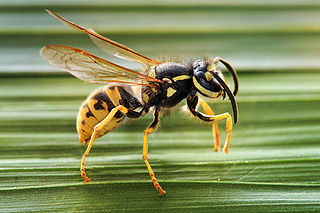
The Vespidae are a large, diverse, cosmopolitan family of wasps, including nearly all the known eusocial wasps and many solitary wasps. Each social wasp colony includes a queen and a number of female workers with varying degrees of sterility relative to the queen. In temperate social species, colonies usually last only one year, dying at the onset of winter. New queens and males (drones) are produced towards the end of the summer, and after mating, the queens hibernate over winter in cracks or other sheltered locations. The nests of most species are constructed out of mud, but polistines and vespines use plant fibers, chewed to form a sort of paper. Many species are pollen vectors contributing to the pollination of several plants, being potential or even effective pollinators, while others are notable predators of pest insect species.

Potter wasps, the Eumeninae, are a cosmopolitan wasp group presently treated as a subfamily of Vespidae, but sometimes recognized in the past as a separate family, Eumenidae.
Mason wasp is a common name that can refer to several different types of wasps:

The Stenogastrinae are a subfamily of social wasps included in the family Vespidae. They are sometimes called hover wasps owing to the particular hovering flight of some species. Their morphology and biology present interesting peculiarities.
Pachodynerus is a fairly large neotropical and nearctic genus of potter wasps with higher diversity in central South America. At least one species has been introduced in other biogeographical regions, including several oceanic islands, while Pachodynerus erynnis occurs on Ascension Island as well as in North America. This genus is most closely related to the genus Euodynerus.

Ancistrocerus is a widely distributed genus of potter wasps present in many biogeographical regions of the world. They are nonpetiolate eumenine wasps with a transverse ridge at the bending summit of the first metasomal tergum and with a low and opaque propodeal lamella completely fused to the submarginal carina.
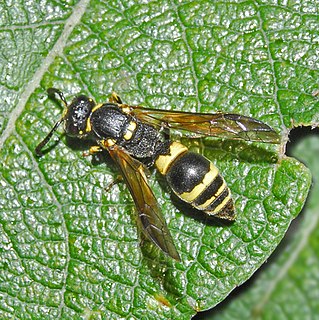
Symmorphus is a primarily holarctic genus of potter wasps.

Pseudodynerus is a small Neotropical genus of potter wasps currently containing 16 species.
Pachodynerus carpenteri is a potter wasp classified in the family Vespidae, subfamily Eumeninae, native to Mexico, Colombia and Venezuela.
Zethus carpenteri is a potter wasp in the family Vespidae, subfamily Eumeninae native to Venezuela.
Pteromenes is a monotypic Afrotropical genus of potter wasps known from Eastern Africa. Its only known species is Pteromenes paradisiacus.
Raphiglossoides is a small genus of afrotropical potter wasps known from South Africa. Only two species are currently known.

Delta emarginatum is a species of potter wasp in the subfamily Eumeninae of the family Vespidae.
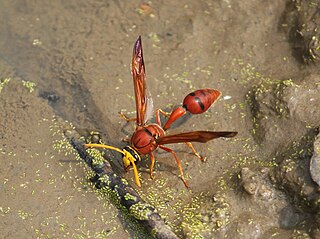
Delta conoideum, the mason wasp, is a species of potter wasp in the subfamily Eumeninae of the family Vespidae.

Symmorphus allobrogus is a species of potter wasps belonging to the subfamily Eumeninae.
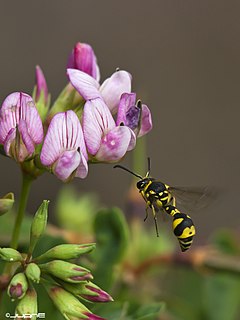
Eumenes mediterraneus is a species of potter wasp in the subfamily Eumeninae of the family Vespidae.
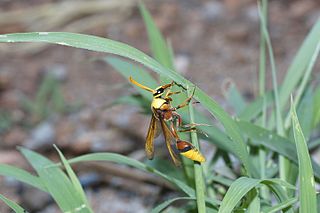
Delta pyriforme is a species of potter wasp in the subfamily Eumeninae of the family Vespidae.
Synagris maxillosa is a species of potter wasp in the subfamily Eumeninae of the family Vespidae.

Rhynchium brunneum is a species of potter wasp found in Asia. Across the wide range, they show considerable variation in the patterning and several subspecies have been described, including:
Anterhynchium abdominale is a species of potter wasp in the family Vespidae. It is native to India, Pakistan and Sri Lanka.












